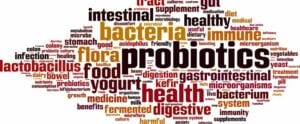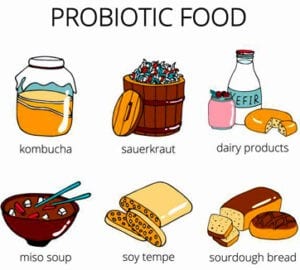What Are Probiotics?
Blue indicates link

Probiotics are made from good bacteria that help keep your body healthy and working well. This good bacteria helps you in many ways, including fighting off bad bacteria and helping you feel better. Probiotics are in foods like yogurt and sauerkraut. They are found in foods or supplements that contain live microorganisms intended to take care of or improve the “good” bacteria within the body.
Where are Probiotics Found In Your Body
Though the most commonplace link to beneficial microbes is in your gut (mostly large intestines), you have several locations in and on your body that host good microbes. These locations are in touch with the “outside world” and include your:
- Gut.
- Mouth.
- Vagina.
- Urinary tract.
- Skin.
- Lungs.
How do probiotics work?
The main job of probiotics, or good bacteria, is to take care of a healthy balance in your body. Think of it as keeping your body neutral. When you are sick, bad bacteria could enter your body and then increase in number. This knocks your body out of balance. Good bacteria will work to fight off the bad bacteria and restore the balance within your body, making you feel better.
Your immune system function and controlling inflammation are supported by good bacteria
Certain types of good bacteria can also:
- Help your body digest food.
- Keep bad bacteria from getting out of control and making you sick.
- Create vitamins.
- Help support the cells that line your gut to prevent bad bacteria
that you may have consumed (through food or drinks) from entering your
blood. - Break down and absorb medications.
There is a natural balancing act that is naturally happening in your body all of the time. You don’t really need or require probiotic supplements to make this happen. Good bacteria are simply a natural part of your body. Eating a well-balanced diet rich in fiber everyday day helps to keep the amount of good bacteria at proper levels.
What are the most common types of probiotic bacteria?
Though there are many types of bacteria that can be considered probiotics, there are two specific types of bacteria that are common probiotics found in stores.
These include:
Probiotics are also made up of good yeast. The most common type of yeast found in probiotics is:
Can I use probiotics to help with medical conditions?
There is currently an outsized amount of research happening around the idea of what probiotics can do for your body. Even though there are a lot of possible positive outcomes, researchers are still working to find out more about how probiotics help with various health conditions. This can vary between people meaning that just because some probiotics may work for you does not mean that they will have the same effect on everyone else.
Some of the conditions that might be helped by increasing the number of probiotics in your body (through food or supplements) include:
- Diarrhea (both diarrhea caused by antibiotics and from Clostridioides difficile (C. diff) infection).
- Constipation.
- Inflammatory bowel disease (IBD).
- Irritable bowel syndrome (IBS).
- Yeast infections.
- Urinary tract infections.
- Gum disease.
- Lactose intolerance.
- Eczema.
- Upper respiratory infections (ear infections, common cold, sinusitis).
- Sepsis (specifically in infants).
- Acid Reflux
- Adrenal Fatigue
Can I take or eat something to increase the good probiotics (microbes) in my body?
You can increase the number of excellent microbes in your body through foods, drinks, and supplements. You may have already got certain foods in your daily diet that contain probiotics. Fermented foods especially (yogurt and pickles, for example) are home to a number of excellent bacteria that benefit your body. You can always add probiotics to your food as a dietary supplement. These aren’t drugs, in order that they don’t get approved by the Federal Drug Administration (FDA). It’s important that you simply always ask your healthcare provider before starting any supplement or major change to your diet.
Can I get probiotics from food?

You can absolutely increase beneficial microbes in your body from the foods you eat. Certain foods have probiotics (good bacteria) in them and can benefit the health of your microbiome.
These foods can be introduced into your diet at any point in the day. You may even be regularly eating them now and not realize that they contain probiotics. You will want to check the food label for “live and
active cultures.” A few suggestions for just some of the probiotic-rich foods you can add to your diet and some times to try them include:
For breakfast, try:
- Yogurt.
- Buttermilk.
- Sourdough bread.
For lunch, try:
- Cottage cheese.
- Kombucha.
- Tempeh.
For a snack, try:
- Fermented pickles.
For dinner, try:
- Fermented sauerkraut.
- Kimchi.
- Miso soup.
Make sure you are still creating a balanced and healthy meal each time you sit down to eat. Though adding probiotic-rich foods into your diet won’t hurt you, balance is still key. Adding too much of just one food prevents your body from reaping the benefits of other food groups.
How do I take a probiotic supplement?
There are several ways you can take a probiotic supplement. They come in a variety of forms, including:
- Foods.
- Drinks.
- Capsules or pills.
- Powders.
- Liquids.
Probiotic supplements may be combined with a prebiotic. Prebiotics are complex carbohydrates that feed the microorganisms in your gut. Basically, prebiotics are the “food source” for good bacteria. They help feed the good bacteria and keep them healthy. Prebiotics include inulin, pectin, and resistant starches.
When you have a supplement that combines a probiotic and prebiotic, it’s called a synbiotic.
Some Uses For Probiotics
Treatment for:
Acne
Controls Weight Loss or Gain
Helps Treat Acid Reflux
Helps Treat Anxiety and Depression
Chronic Fatigue Syndrome
Relief of Constipation
How effective are probiotics?
There’s constant research on the topic. While many research studies have had positive results on the impact of probiotic supplements, more research remains needed. It’s also important to keep in mind that, unlike medications, dietary supplements don’t get to be approved by the FDA.
Always talk together with your healthcare provider (or pediatrician) before taking a supplement or giving one to your child. Supplements might interfere with the medicines you may be taking. If you are pregnant or breastfeeding, check with your provider before taking any supplement.
How safe are probiotics?
Because microbes used as probiotics already exist naturally in your body, probiotic foods, and supplements are generally considered safe. They may trigger allergic reactions, and may also cause mild stomach upset, diarrhea, flatulence (passing gas), and bloating for the first few days after starting to take them. There are certain people who need to use caution when using probiotic supplements. There is a risk of infection in some people.
These people include those who have:
- A weakened immune system (those going through chemotherapy for example).
- A critical illness.
- Recently had surgery.
Caution should also be used when giving probiotics to very sick infants.
Always talk to your healthcare provider before starting a probiotic supplement.
Can probiotics hurt me?
For most healthy people, probiotics don’t cause any harm. They are generally considered safe and are often “given a try” to see if they could help with various medical conditions. There’s a lot of research on the topic of probiotics. Scientists are trying to determine when and how they should be used, as well as how effective they are. Talk to your healthcare provider before starting a probiotic supplement because there are some cases where you shouldn’t be taking them. It’s always best to have the conversation first before starting a new supplement.
Are there any risks related to probiotics?
Probiotics are generally considered safe. However, there are some risks linked to the supplements. These risks are increased if you have a medical condition that weakens your immune system, have recently had
surgery or have other serious medical conditions.
Unlikely, but possible, risks can include:
- Developing an infection.
- Developing resistance to antibiotics.
- Developing harmful byproducts from the probiotic supplement.
Should I give probiotics to my kids?
Probiotics can be beneficial for both adults and kids. If your child has an illness that requires antibiotic medication for treatment, taking a probiotic can help shorten symptoms. Probiotics can also be used to help relieve constipation, acid reflux, diarrhea, gas, and eczema in children.
Introducing probiotics into your child’s diet through food is typically a safe way to give them probiotics. Foods like yogurt and cottage cheese are often part of a balanced diet and can add in good bacteria without much risk.
There are commercially available probiotic supplements specifically designed for infants and children. However, it is important to talk to your child’s pediatrician before giving them any probiotic supplement or changing the child’s diet to include probiotic-rich foods.
Should I try probiotics?
If you are interested in adding probiotics to your diet, it’s worth a conversation with your healthcare provider. Many providers may suggest giving them a try to see if they help with your general health. It is important to remember that not all probiotics behave the same way and have the same effects. Each has its own individual benefits. They generally don’t cause harm. One easy way to start can be by simply introducing probiotic-rich foods into your diet, like yogurt.
Conclusion:
Before you start any supplements, make sure you talk to your healthcare provider. Your provider may be able to point you in the right direction, helping you figure out the best probiotic to take, how much to take, and when to take it. A conversation is always worth the time
when it concerns your health.
Resources:
https://www.ncbi.nlm.nih.gov/pmc/articles/PMC5418745/
https://pubmed.ncbi.nlm.nih.gov/23886975/
https://pubmed.ncbi.nlm.nih.gov/25630516/
Thank you for reading
Michael
Comments are welcome
What an interesting article! I have heard a lot about the importance of taking care of our gut health, as it is considered our second brain and has a very important impact on our physical and mental health. It seems that the best way to take care of our gut flora is by eating healthy and making sure we have lots of good bacteria in our gut.
My diet has been plant-based for a couple of years now and I regularly take miso and tempeh, as well as a supplement I occasionally put in my soya yoghurt. I have heard that due to excessive consumption of processed foods we have less good bacteria in our gut, which can lead to health problems.
Thank you for sharing this.
Best Regards,
Marta
Hi Marta,
Thank you for your comments. It sounds like you live a healthy life and that is great. You are right a lot of diseases are related to what we put in our gut.
All the best,
Michael
Hello Micheal,
Thank you for this in-depth look at pro-biotic. I learn a few things about it and I’m that is probably one of the reason you are doing what you do.
I’m a big advocate when it come to health. A healthy body allows you to have a healthier lifestyle. I suffer from constipation so I’m always looking for ways to keep a clean gut.
Great job, I wish you well.
Nicole
Hi Nicole,
Thank you for your comments. I have different articles on gut health if you are interested. Probiotics are only a small part of having a healthy gut.
All the best,
Michael